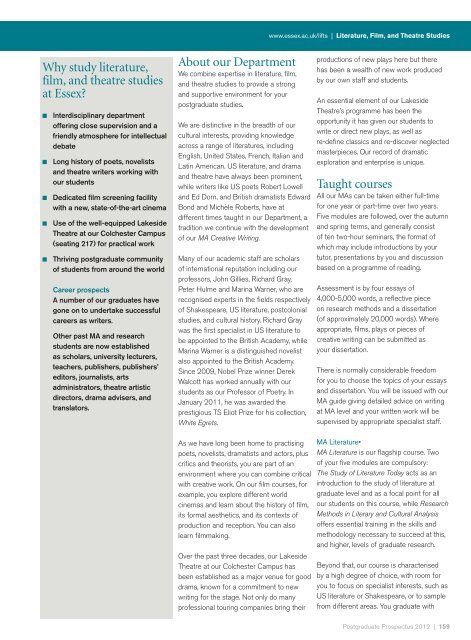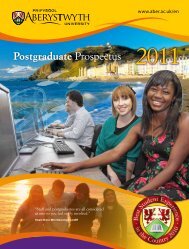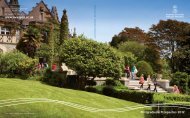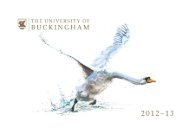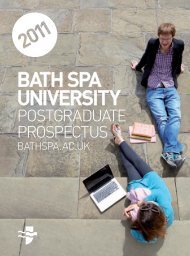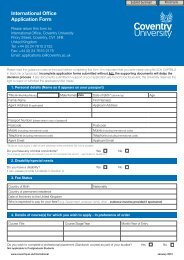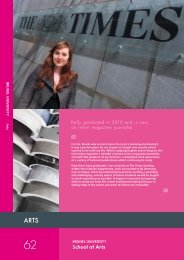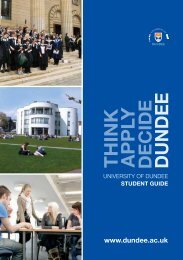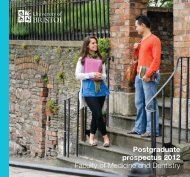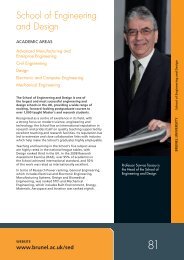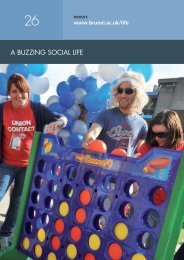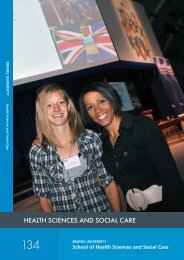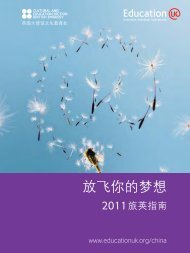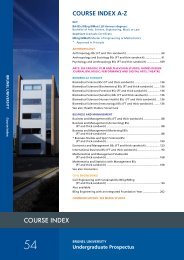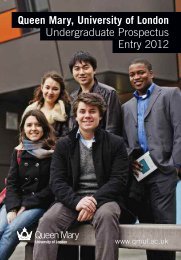Postgraduate Prospectus
Postgraduate Prospectus
Postgraduate Prospectus
Create successful ePaper yourself
Turn your PDF publications into a flip-book with our unique Google optimized e-Paper software.
www.essex.ac.uk/lifts | Literature, Film, and Theatre Studies<br />
Why study literature,<br />
film, and theatre studies<br />
at Essex?<br />
n<br />
n<br />
n<br />
n<br />
n<br />
Interdisciplinary department<br />
offering close supervision and a<br />
friendly atmosphere for intellectual<br />
debate<br />
Long history of poets, novelists<br />
and theatre writers working with<br />
our students<br />
Dedicated film screening facility<br />
with a new, state-of-the-art cinema<br />
Use of the well-equipped Lakeside<br />
Theatre at our Colchester Campus<br />
(seating 217) for practical work<br />
Thriving postgraduate community<br />
of students from around the world<br />
Career prospects<br />
A number of our graduates have<br />
gone on to undertake successful<br />
careers as writers.<br />
Other past MA and research<br />
students are now established<br />
as scholars, university lecturers,<br />
teachers, publishers, publishers’<br />
editors, journalists, arts<br />
administrators, theatre artistic<br />
directors, drama advisers, and<br />
translators.<br />
About our Department<br />
We combine expertise in literature, film,<br />
and theatre studies to provide a strong<br />
and supportive environment for your<br />
postgraduate studies.<br />
We are distinctive in the breadth of our<br />
cultural interests, providing knowledge<br />
across a range of literatures, including<br />
English, United States, French, Italian and<br />
Latin American. US literature, and drama<br />
and theatre have always been prominent,<br />
while writers like US poets Robert Lowell<br />
and Ed Dorn, and British dramatists Edward<br />
Bond and Michèle Roberts, have at<br />
different times taught in our Department, a<br />
tradition we continue with the development<br />
of our MA Creative Writing.<br />
Many of our academic staff are scholars<br />
of international reputation including our<br />
professors, John Gillies, Richard Gray,<br />
Peter Hulme and Marina Warner, who are<br />
recognised experts in the fields respectively<br />
of Shakespeare, US literature, postcolonial<br />
studies, and cultural history. Richard Gray<br />
was the first specialist in US literature to<br />
be appointed to the British Academy, while<br />
Marina Warner is a distinguished novelist<br />
also appointed to the British Academy.<br />
Since 2009, Nobel Prize winner Derek<br />
Walcott has worked annually with our<br />
students as our Professor of Poetry. In<br />
January 2011, he was awarded the<br />
prestigious TS Eliot Prize for his collection,<br />
White Egrets.<br />
productions of new plays here but there<br />
has been a wealth of new work produced<br />
by our own staff and students.<br />
An essential element of our Lakeside<br />
Theatre’s programme has been the<br />
opportunity it has given our students to<br />
write or direct new plays, as well as<br />
re-define classics and re-discover neglected<br />
masterpieces. Our record of dramatic<br />
exploration and enterprise is unique.<br />
Taught courses<br />
All our MAs can be taken either full-time<br />
for one year or part-time over two years.<br />
Five modules are followed, over the autumn<br />
and spring terms, and generally consist<br />
of ten two-hour seminars, the format of<br />
which may include introductions by your<br />
tutor, presentations by you and discussion<br />
based on a programme of reading.<br />
Assessment is by four essays of<br />
4,000-5,000 words, a reflective piece<br />
on research methods and a dissertation<br />
(of approximately 20,000 words). Where<br />
appropriate, films, plays or pieces of<br />
creative writing can be submitted as<br />
your dissertation.<br />
There is normally considerable freedom<br />
for you to choose the topics of your essays<br />
and dissertation. You will be issued with our<br />
MA guide giving detailed advice on writing<br />
at MA level and your written work will be<br />
supervised by appropriate specialist staff.<br />
As we have long been home to practising<br />
poets, novelists, dramatists and actors, plus<br />
critics and theorists, you are part of an<br />
environment where you can combine critical<br />
with creative work. On our film courses, for<br />
example, you explore different world<br />
cinemas and learn about the history of film,<br />
its formal aesthetics, and its contexts of<br />
production and reception. You can also<br />
learn filmmaking.<br />
Over the past three decades, our Lakeside<br />
Theatre at our Colchester Campus has<br />
been established as a major venue for good<br />
drama, known for a commitment to new<br />
writing for the stage. Not only do many<br />
professional touring companies bring their<br />
MA Literature•<br />
MA Literature is our flagship course. Two<br />
of your five modules are compulsory:<br />
The Study of Literature Today acts as an<br />
introduction to the study of literature at<br />
graduate level and as a focal point for all<br />
our students on this course, while Research<br />
Methods in Literary and Cultural Analysis<br />
offers essential training in the skills and<br />
methodology necessary to succeed at this,<br />
and higher, levels of graduate research.<br />
Beyond that, our course is characterised<br />
by a high degree of choice, with room for<br />
you to focus on specialist interests, such as<br />
US literature or Shakespeare, or to sample<br />
from different areas. You graduate with<br />
<strong>Postgraduate</strong> <strong>Prospectus</strong> 2012 | 159


